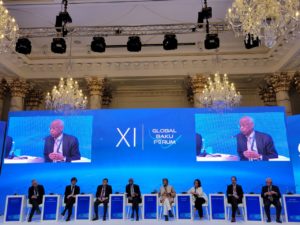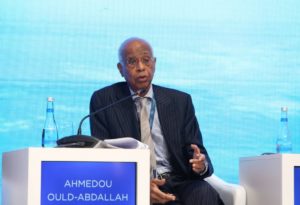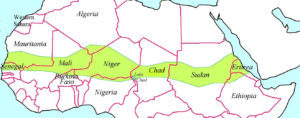The New Peace Agenda: building resilience to global challenges.
 The New Peace Agenda: building resilience to global challenges.
The New Peace Agenda: building resilience to global challenges.
Unitar 17 April 2024, Geneva.
Ahmedou Ould Abdallah, president centre4s, former UN SG Special Representative.

 The New Peace Agenda: building resilience to global challenges.
The New Peace Agenda: building resilience to global challenges.
Unitar 17 April 2024, Geneva.
Ahmedou Ould Abdallah, president centre4s, former UN SG Special Representative.
 Ahmedou Ould – Abdallah, President Centre4s
Ahmedou Ould – Abdallah, President Centre4s
Below a summary of my oral presentation
For its annual conference, the Baku Forum has rightly selected this most central theme: ‘’building resilience to global challenges.’’ Migration, whatever regular or irregular, is of concern to many states if not or all of them: those of origin, transit and destination. Today, ignoring migrations challenges amounts to a huge legal case.
 BAKU, Azerbaijan, March 16. Migration is a very serious demographic problem, former Special Representative of the UN Secretary-General for West Africa Ahmedou Ould-Abdallah said during the panel session on « Regional Perspectives: The European Union and its Neighbors » within the framework of the XI Global Baku Forum, Trend reports.
BAKU, Azerbaijan, March 16. Migration is a very serious demographic problem, former Special Representative of the UN Secretary-General for West Africa Ahmedou Ould-Abdallah said during the panel session on « Regional Perspectives: The European Union and its Neighbors » within the framework of the XI Global Baku Forum, Trend reports.
 Returning from a week-long trip to Japan, I’m pleased to share with you a few of my first impressions. Impressions on both the trip organization as well as on substantive discussions I had with a number of officials and governmental and private organizations.
Returning from a week-long trip to Japan, I’m pleased to share with you a few of my first impressions. Impressions on both the trip organization as well as on substantive discussions I had with a number of officials and governmental and private organizations.
 A multitude of actors are fighting terrorism in the Sahel: the concerned countries armies with the help of civilian auxiliaries and international partners. From 2012 to now, the fighting has sometimes intensified, sometimes decreased and then turned into an implicit truce. Terrorist groups abounded and fought each other for supremacy on the ground. The hydra is still there, causing, among other things, human tragedies. Relations between partners – African and international governments – have deteriorated to the point of destroying coalitions and regional organizations. A feeling of waste and failure prevails.
A multitude of actors are fighting terrorism in the Sahel: the concerned countries armies with the help of civilian auxiliaries and international partners. From 2012 to now, the fighting has sometimes intensified, sometimes decreased and then turned into an implicit truce. Terrorist groups abounded and fought each other for supremacy on the ground. The hydra is still there, causing, among other things, human tragedies. Relations between partners – African and international governments – have deteriorated to the point of destroying coalitions and regional organizations. A feeling of waste and failure prevails.